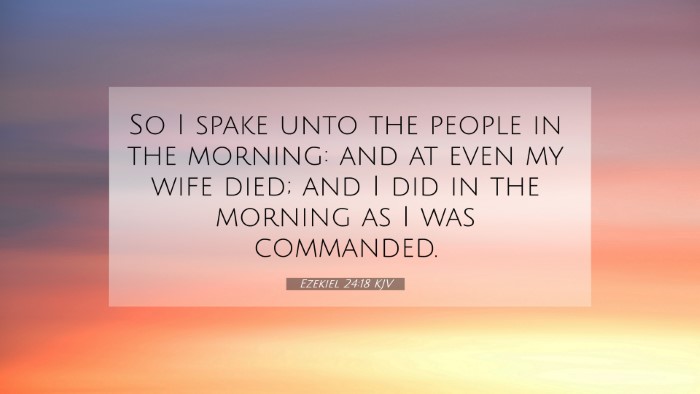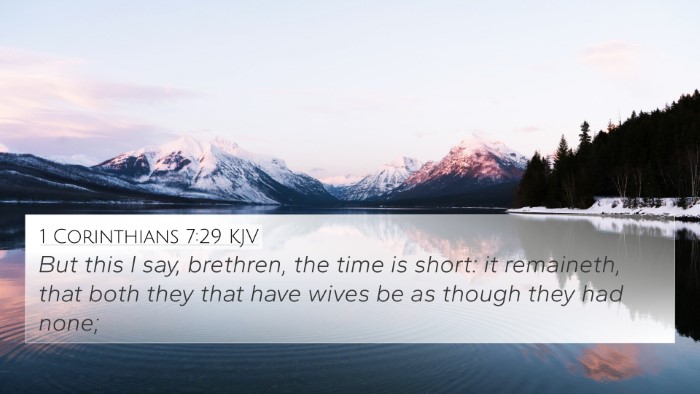Ezekiel 24:18 - Summary and Interpretations
Ezekiel 24:18 states:
"So I spoke to the people in the morning; and at evening my wife died. And the next morning I did as I was commanded."
This verse encapsulates a profound moment of personal tragedy for the prophet Ezekiel, who is commanded by God to endure suffering and loss as a vivid illustration of the impending judgment on Jerusalem. To understand this verse in its Biblical context, we will delve into various public domain commentaries for deeper interpretation.
Historical Context
The historical backdrop of Ezekiel's writings is crucial for interpreting this verse. During the time of Ezekiel, Jerusalem faced imminent ruin, and God often conveyed messages through profound symbols and personal experiences. Ezekiel’s wife’s death serves as a potent symbol of the loss the people of Israel would experience due to their disobedience.
Commentary Insights
Matthew Henry's Commentary
Matthew Henry notes the seriousness of God’s commands and the depth of Ezekiel’s personal loss, emphasizing that God often requires His prophets to experience suffering to communicate His truths effectively. The prophet's immediate obedience showcases his faithfulness, even amidst personal grief.
Albert Barnes' Notes on the Bible
Albert Barnes sheds light on the symbolic actions that God instructed Ezekiel to undertake. He explains that Ezekiel's mourning for his wife was to be unexpressed, paralleling how Jerusalem would not have the opportunity to mourn for its impending destruction. This serves as a theme of divine judgment being brought upon a rebellious nation.
Adam Clarke's Commentary
Adam Clarke expands on the implications of Ezekiel’s silence during his mourning. He articulates that in mourning for Jerusalem, there would be no outward expression of sorrow allowed, reflecting the gravity of God's judgment. Clarke's perspective highlights the connection between personal experience and prophetic duty.
Thematic Connections
Several Biblical themes emerge from Ezekiel 24:18, underlining the interaction between personal loss and public prophecy:
- Divine Judgment: The loss symbolizes the devastation that Jerusalem will face.
- Prophetic Suffering: Prophets often bear burdens reflective of the spiritual condition of their people.
- Obedience to God: Ezekiel's actions portray the importance of following God’s commands, even in hardship.
Cross-References
Ezekiel 24:18 connects with several other Biblical verses that reinforce the themes presented:
- Jeremiah 16:1-4: Here, God commands Jeremiah not to marry or have children due to the coming calamity, mirroring Ezekiel's situation.
- Isaiah 22:12-14: A call for mourning for the people’s sins, reflecting the urgency of repentance.
- Lamentations 1:12: A lamentation that expresses the grief of a besieged Jerusalem, akin to Ezekiel’s personal mourning.
- Ezekiel 3:26-27: God communicates the prophet’s role in delivering His messages, emphasizing obedience.
- Matthew 10:37-39: Jesus teaches about the costs of discipleship, drawing parallels with Ezekiel’s sacrifices.
- Luke 14:26: Another affirmation of the radical commitment required in following God's path.
- Revelation 21:4: A future promise of no more sorrow, juxtaposed with present suffering for God’s prophets.
Applications and Lessons
The analysis of Ezekiel 24:18 encourages us to reflect on several essential lessons:
- The Weight of Prophetic Responsibility: Carrying God's messages often involves personal sacrifice.
- Responding to Divine Commands: Obedience, even amidst grief, can yield profound spiritual significance.
- Acknowledging Loss: Recognizing the weight of loss in our lives and how it can shape our understanding of God's messages.
Conclusion
Ezekiel 24:18 serves as a poignant reminder of the intertwining of personal loss and prophetic duty. The insights from public domain commentaries enhance our understanding of this verse, encouraging a deeper exploration of the complexities of God’s intentions and the responsibilities of His prophets. The thematic connections, reinforced by cross-references, provide a foundation for further study and reflection among those seeking to understand the Scriptures deeply.
Further Study Tools
For those studying the intricacies of Biblical texts and seeking cross-references, several tools may prove useful:
- Bible Concordance: A comprehensive listing that helps locate verses and concepts across the Scriptures.
- Bible Cross-Reference Guide: Resources that facilitate the identification of related verses.
- Cross-Reference Bible Study: Methods that connect themes across various books of the Bible.



